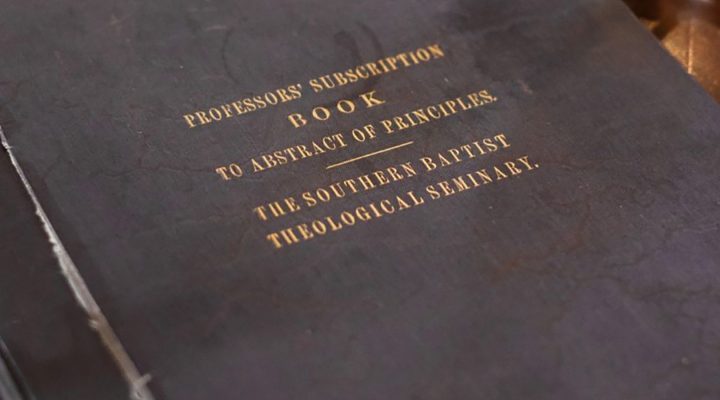Thirty years ago next month, Marv Knox and I warned Southern Baptists about the rising influence of Neo-Calvinism in their ranks. To most, this was shocking news at the time.
Our words were more prophetic than we possibly could have imagined. Today, Calvinism is embraced by a large minority of Southern Baptist pastors and is taught without hesitation at Southern Baptist Theological Seminary, the largest of the Southern Baptist Convention seminaries.

Marv Knox, 1990

Mark Wingfield, 1990
In November 1994, Marv and I worked together at the Western Recorder, the historic weekly Baptist newspaper in Kentucky, he as editor and I as news director. Al Mohler had recently ascended to the presidency of Southern Seminary in Louisville and brought with him an agenda to return the seminary to its Calvinist roots.
Abstract of Principles
At the heart of this movement was the seminary’s “Abstract of Principles,” a doctrinal statement seminary faculty were required to sign and affirm.
Among its 20 articles, the Abstract includes these two:
- Providence: “God from eternity decrees or permits all things that come to pass, and perpetually upholds, directs and governs all creatures and all events; yet so as not in any wise to be the author or approver of sin nor to destroy the free will and responsibility of intelligent creatures.”
- Election: “Election is God’s eternal choice of some persons unto everlasting life — not because of foreseen merit in them, but of his mere mercy in Christ — in consequence of which choice they are called, justified and glorified.”
That language is undeniably Calvinist in perspective — God decreeing and permitting all things that happen (predestination) and God electing “some persons unto eternal life,” which according to Calvinist theology means God also has elected some people to damnation.
While the 1859 founders of Southern Seminary were indeed Calvinists, the seminary and the SBC had moved on from that perspective as Southern Baptists embraced the Great Commission with more of a “whosever will may come” theology. That was the growth engine for the SBC in the post-World War II Baby Boom.
“Lurking in the shadows all along was a remnant of the old Calvinism — a tiny fringe element that generally was not taken seriously.”
But lurking in the shadows all along was a remnant of the old Calvinism — a tiny fringe element that generally was not taken seriously. Until the Mohler era at Southern Seminary. Then, the fringe began to move toward the center and for the first time in decades had one of its own in a place of prominent leadership.
Paul was a Calvinist?
In our 1994 series, we quoted Mohler, who told us: “I firmly believe the Apostle Paul held to these convictions, and he was the greatest missionary in the history of the church.”
Unlike the old Calvinists who famously chided young William Carey and his zeal for missions — “Sit down, young man. When God pleases to convert the heathen, he’ll do it without consulting you or me.” — the Neo-Calvinists portrayed their theology as driven by missions and evangelism to reach the elect.
Other conservatives in the SBC weren’t buying that argument in 1994.
We quoted Robert Sloan, a New Testament scholar who then was dean of Truett Seminary at Baylor University and later university president: “Five-point Calvinism is not biblically grounded. It cannot be sustained by the Scriptures. It is a dagger to the heart of evangelism. The simple historical fact is that it is a deterrent to evangelism.”
“Five-point Calvinism is … a dagger to the heart of evangelism.”
And then Sloan made this prediction: “If the true five-point Calvinists in the conservative movement dare to speak up and declare their views and publicly have the courage of their convictions, it will produce a division within the politically conservative movement.”
Sloan was right. The Neo-Calvinists rode in on the coattails of the “conservative resurgence” in the SBC yet found themselves at odds with the hyper-evangelistic majority in that movement. The two kinds of conservatives found common cause in fighting perceived liberalism but once they drove those liberals out of the SBC, they were left to contend with each other’s theology.
An uneasy truce
The result has been an uneasy truce that has lasted three decades but has left the Calvinists unable to be elected to the presidency of the SBC. They no longer live in the shadows, but they also cannot get control of the denomination.
Except for Southern Seminary, which now churns out Calvinist-influenced clergy by the hundreds every year. That, in turn, influences Southern Baptist churches. And as I have written before, often those churches don’t know what they’re getting.
In 1994, Marv Knox wrote an editorial on Calvinism that concluded: “If the Calvinists and the SBC’s conservative political leadership cross theological swords, don’t expect the Calvinists to win. Like the moderates, their theology has been constructed rationally, which follows a minority strain in Baptist history. The new SBC leaders, however, reflect the dominant strain, a heart religion that bases its belief and derives its power from religious feelings about what is right and wrong. And in Baptist life, the heart wins out over the head every time.”
Mohler got the keys
Last week, I asked Marv to reflect on what he’s learned and observed about all this in the past 30 years. He’s a Southern Seminary graduate from a previous era, by the way.
“Thinking back on my years as a Southern Seminary student, 1981 to 1984, I don’t recall professors talking much about James Petigru Boyce and the seminary’s Reformed roots. We focused much more on the leadership of E.Y. Mullins, Southern’s fourth president, from 1899 until his death in 1928.
“Mullins was a true Southern Baptist statesman. He served as president of both the Baptist World Alliance and the SBC. He led in development of the 1925 Baptist Faith and Message, a moderating theological statement that enabled the SBC to negotiate the fundamentalist land mines of that era. For most of the 20th century, Southern Seminary focused on Mullins a great deal and Boyce not so much.”
“We thought of Mohler’s brand of Calvinism as an SBC anomaly.”
Back in 1994, he said, “we thought of Mohler’s brand of Calvinism as an SBC anomaly. I wouldn’t have been surprised if he had lost his job when Southern Baptists realized he didn’t think about God’s sovereignty and the missions imperative the same way they did.
“As it turned out, Mohler got the keys to the most powerful tractor in the SBC’s barn. Under his leadership, Mohler sowed the seeds of Calvinism across the fertile fields of Southern Baptist pastoral preparation. Across three decades, the SBC’s largest seminary has trained legions of pastors, teaching them Calvinism is normative theology for the denomination.”
Back in 1994, one year into his seminary presidency, here’s how Mohler described his view of the Bible: “All biblical Christians must agree based upon the New Testament that there will be those who are saved and those who are not. An honest reading of the New Testament must acknowledge that it is God who determines who will be saved.”
This is the theology being taught in Southern Baptists’ largest and most influential seminary. The countervailing argument embodied in a sister SBC school, Southwestern Seminary in Fort Worth, Texas, was squandered by its self-serving former president, Paige Patterson.
Now, 30 years later, Mohler stands as the de facto pope of the SBC. He is both reviled and revered among Southern Baptists. But above all else, he has planted the seeds of Calvinism far and wide in the nation’s largest Protestant denomination.
It may take another 30 years to see what fruit is produced from that effort.
Hear more about the rise of Calvinism in the SBC on BNG’s “Stuck in the Middle with You” podcast with Mark Wingfield and Benjamin Cole.
Mark Wingfield serves as executive director and publisher of Baptist News Global. He is the author of Honestly: Telling the Truth About the Bible and Ourselves and Why Churches Need to Talk About Sexuality. His brand-new book is Troubling the Truth and Other Tales from the News.
Related articles:
Why a Calvinist pastor may be coming to your church | Opinion by Mark Wingfield
Why is there a growing trend toward elder governance in Southern Baptist churches? | Analysis by Rodney Kennedy
The five pillars of conservative evangelical Calvinism that are incompatible with love


